on the small press, part two: 'the future is back'
The second in a series of posts featuring editors and publishers discussing their projects. First up: Noel Black and Mary Burger.
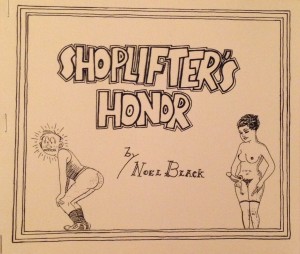
—Noel Black
Angry Dog Press started in 1998, I think. It was the imprint under which Ed Berrigan and I started LOG Magazine in San Francisco after my short time at New College. I didn't find publishing a magazine all that satisfying, though it was great to make contact with a lot of poets. I also really loved designing the covers and did some letterpress and some silkscreening for issues #2 and #3. This was mostly pre-internet, so we latched on to the whole mimeo tradition of 8 and 1/2 x 11" format with great covers by artists like Will Yackulic. The guts were photocopied at the dump where our friend, the artist Bryce Hobbs worked. It's almost impossible for me to understand how we had the gumption to do all that manual labor in the middle of the night then, but it was, and still is, part of how poets socialize—around projects.
Anyhow, we only put out three issues when I started getting interested in books. Then Ed moved back to NYC. So I did a few projects including Owen Hill's amazing pre-conceptualist Selected Poems of George Sanders (all cribbed from Sanders's autobiography), and one full-length book, Like Rain by Kevin Opstedal.
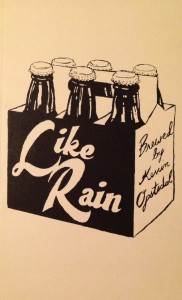
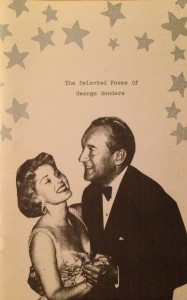
This was also during the so-called poetry wars (I've also heard "foetry",—maybe Johannes Göransson said it?—which is even better).
Anyhow, I ended up on the other side of the fence from the LANGUAGE thing through a combination of sheer naivete and for reasons that I've written and talked about other places, but mainly because the theory felt strident and the work itself bored me. Plus, coming from Colorado Springs, I think I get turned off by the faintest whiff of fundamentalisms in any arena. I wish I could remember who it was that said, "Poets are natural fascists." There's some truth to it.
What interested me was the seeming fluidity and jokiness of the New York school, particularly the second generation. I'd grown up in the queer community in Colorado Springs and spent many of my childhood weekends watching Saturday Night Live and listening to George Carlin records with my best friend, Marc. So finding Eileen Myles and Ron Padgett completely blew my mind as far as poetry was concerned. They were doing something that felt so free from from the tedium of both the academic pastoral and the theory-driven work of the LANGUAGE poets from my perspective. It was easy to want to join that loose tradition of coterie. And part of that tradition involved hanging out with artists and putting out beautiful, staple-bound, small-press publications by the poets you liked.
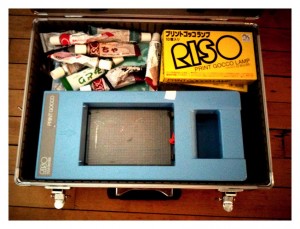
I don't remember exactly when it was, but sometime around 2000 there was an amazing little plastic press on the market called GOCCO. It was basically a kind serigraphy process, except with these photo-screens that you'd burn with a photocopy of an image and old camera flash bulbs. Then you could buy all these inks and smoosh them through the screen onto fabric or paper. I was in love the first time I tried it, and I think it was that press and the ease of printing beautiful color images that made me want to do the Angry Dog Midget books, which are about the size of the GOCCO screens (approx 4 and 1/4 x 5 and 1/2"). Card stock was cheap and somebody always had a photocopier hookup. Kevin Opstedal was, for many of us on the W. Coast at that time, THE hookup for photocopies. So yeah, I'd just ask my artist and writer friends for work. And even if you didn't know someone very well they'd usually send you a manuscript and you'd get to be friends during the process of putting the book out. I also (masochistically) decided to type up the guts of (almost) all the books except for the longer prose pieces. It was overly quaint, maybe, but it was another way of getting closer to the work. And it went from there for about 3 years until I was able to put the whole box sets together. Needless to say, it was an enormous project, but totally great.
It was also totally amateur in the sense that making and sending out the books was the payoff. I've sold some sets and some individual copies, but compared to the amount of time and materials I put in over the years, there's just no money in it.
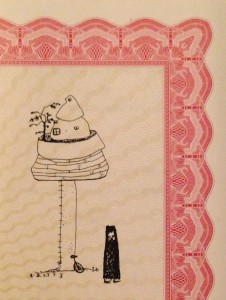
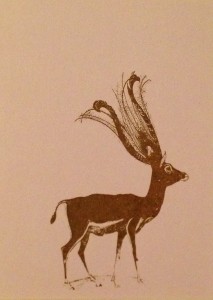
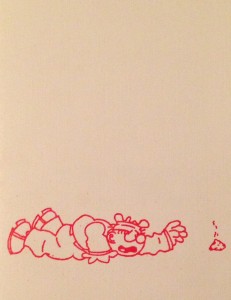
I finished the Midget books after we moved back to Colorado Springs in 2001 and it became a great way to stay in touch with the broader poetry scene for a few years. But then I had these sort of Rip van Winkle years where I mostly published a couple of local satirical newspapers that took on all the evangelical culture here. And I actually made a living doing that, and it was an amazing period of time in which this weird city became the ideological center of the conservative universe. But even my ad hoc career in pseudo-journalism came out of the experience of small-press poetry pubishing 100%—the knowledge that you don't need someone else's permission to publish your thoughts and ideas. And, more likely: no one but you will publish them if your ideas are at all incongruous or you're just unknown. Anyway, I lost touch with poetry for almost 10 years (my wife letterpresed me this business card with a football player on it that says: Noel Black, former poet) when Julien Poirier at Ugly Duckling asked me if I wanted to do a book. When my book came out in 2012, I went to AWP in Chicago and it was very much like waking up under the tree with a giant beard. I felt completely old and out of touch! The small press poetry world had exploded. Tables X and Y were suddenly this huge force and center of energy. And it was all very professional for the most part. I think what was most shocking was how many of the punk-ass poets now had MFAs and even PhDs and real teaching gigs. It didn't even seem like an option in the late 90s unless you had a degree from Iowa, so why bother? I dropped out of New College because I didn't want the debt. And even if I had finished, I'd only have had an M.A., which is useless. So yeah, in the decade since I left the Bay Area, the MFA programs had exploded, and all the various strains of the avant-everything had been incorporated, and the internet had connected it all and it was... I felt like a time capsule.
Now that I have two kids, there's no way I could do a project like the Midget Editions again, nor would I want to.
This past February, I took my remaining stock of the Midgets to AWP in Seattle and it was great to have them laid out there in the future. Chapbooks—especially self- or friend-published chapbooks—still mean a lot to me. They're a way of jumping yourself into the poetry gang and asking to be taken seriously in a world that no one takes seriously, and neither should you.
As far as contests, I couldn't care less. That was never what drew me in.
As far as the future from here, I have high hopes for .PDF publishing. For someone like me out here in the gulag, the internet provides access in a way that allows me to rejoin the conversation I left for all those years. And .PDF publishing has essentially the same economics of a late-90s chapbook press: None. It's a disease and a vow, publishing—a monasticism of the obscene; "literary meningitis." My new .PDF press is called The New Heave-Ho, and I haven't had much time to devote to it, but I plan to release 5 or 6 new books in May by Erin Morrill, Nico Alvarado, Guillermo Rebollo-Gil, Mara Pastor, Julio Zambrano (an AWOL E Bay poet from the late-90s), and several others if I can get them together. I'm more interested in getting works of other loner poets out right now. Either people who are geographically isolated or forgotten. Publishing .PDFs makes the poetry world a lot smaller. I love reading/scanning all the Gauss-PDF and Troll Thread books/docs, and the Dusie and Publishing Genius, etc. chaps online. More presses should just put up their proofs online like Ugly Duckling's doing now. The future is back!
***
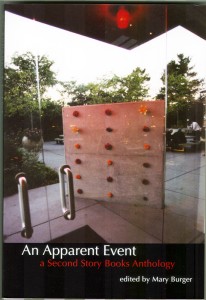
—Mary Burger
The press grew out of my reading and writing. I published manuscripts that I wanted to spend more time with, and that contained something I aspired to in my writing. I published work that I wanted to put into the conversations going on around me. Mostly I was interested in works that used sentences with a certain kind of self-awareness—making a commentary on or dismantling the surface put forward in the work.
Some things I published were already making their rounds in PDFs or photocopies or excerpts in journals, but I wanted to give them the status of individual artifacts, to pull them out at least for a moment from the endless churn of language. My models when I started in the late 90s were Tuumba and O Books, created by individual writers I admired, and operating on relatively small scales but making books that were really meaningful for the small-press world.
When I started the press, Small Press Distribution was still distributing handmade books with no ISBN numbers, so they distributed the chapbooks. Later I produced a few books with spines and ISBNs. I intended to keep doing that, but I changed jobs and took on other commitments. I had less time and couldn’t keep the press going.
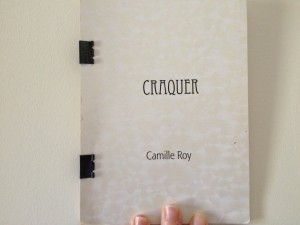
The economics were that I self-funded everything and donated my labor, skills, and time. I had volunteer help sometimes. Sales didn’t cover expenses. At first I thought losing money meant I was “doing it wrong,” but then I realized it’s kind of unavoidable. Chapbooks were fairly inexpensive to make. Print-on-demand books cost more, but were within reach if the print runs were kept to a few hundred or less.
I was really interested in the book object—the cover art and paper and fonts and page design—and threw myself into learning typography and desktop publishing and so on. But my biggest lesson was discovering how a small book really does travel through communities of writers and start conversations and create relationships. I wanted that to happen, but it was all the same amazing when it did.
I still see work all the time that I’d like to publish. I still have ideas about how a press or some sort of channel-for-writing can contribute to the conversation. Whatever form my publishing projects take in the future will probably be different from what they were in the past. What’s encouraging is that there are always more and more presses and magazines and outlets for writing. The small-press world is continually self-generating, which is amazing considering how much work it all is. There are a lot of writers who want community, and they’re working really hard to make that happen. And in a lot of ways it’s working.
Stephanie Young lives in Oakland, California. Her collections of poetry include Telling the Future Off...
Read Full Biography

